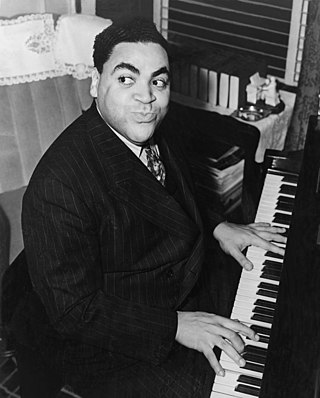
Thomas Wright "Fats" Waller was an American jazz pianist, organist, composer, and singer. His innovations in the Harlem stride style laid much of the basis for modern jazz piano. A widely popular star in the jazz and swing eras, he toured internationally, achieving critical and commercial success in the United States and Europe. His best-known compositions, "Ain't Misbehavin'" and "Honeysuckle Rose", were inducted into the Grammy Hall of Fame in 1984 and 1999.

Deborah Ann Gibson is an American singer, songwriter, and actress.

Victor August Herbert was an American composer, cellist and conductor of English and Irish ancestry and German training. Although Herbert enjoyed important careers as a cello soloist and conductor, he is best known for composing many successful operettas that premiered on Broadway from the 1890s to World War I. He was also prominent among the Tin Pan Alley composers and was later a founder of the American Society of Composers, Authors, and Publishers (ASCAP). A prolific composer, Herbert produced two operas, a cantata, 43 operettas, incidental music to 10 plays, 31 compositions for orchestra, nine band compositions, nine cello compositions, five violin compositions with piano or orchestra, 22 piano compositions and numerous songs, choral compositions and orchestrations of works by other composers, among other music.
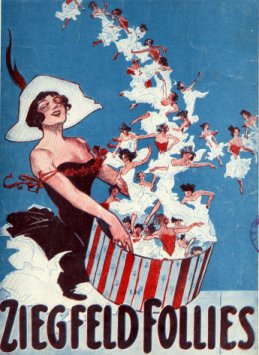
The Ziegfeld Follies were a series of elaborate theatrical revue productions on Broadway in New York City from 1907 to 1931, with renewals in 1934, 1936, 1943, and 1957. They became a radio program in 1932 and 1936 as The Ziegfeld Follies of the Air.

Van and Schenck were popular American entertainers in the 1910s and 1920s: Gus Van, baritone, and Joe Schenck (pronounced "skenk"; born Joseph Thuma Schenck,, tenor. They were vaudeville stars and made appearances in the Ziegfeld Follies of 1918, 1919, 1920 and 1921. They made numerous phonograph records for the Emerson, Victor, and Columbia record companies.

Oscar Levant was an American concert pianist, composer, conductor, author, radio game show panelist, television talk show host, comedian, and actor. He had roles in the films Rhapsody in Blue (1945), The Barkleys of Broadway (1949), An American in Paris (1951), and The Band Wagon (1953). He was awarded a star on the Hollywood Walk of Fame in 1960 for recordings featuring his piano performances. He was portrayed by Sean Hayes in the Broadway play Good Night, Oscar, written by Doug Wright. Levant appeared as himself in the Gershwin biopic Rhapsody in Blue (1945).
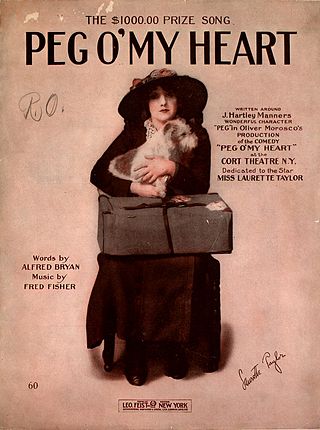
"Peg o' My Heart" is a popular song written by Alfred Bryan (words) and Fred Fisher (music). It was published on March 15, 1913 and it featured in the 1913 musical Ziegfeld Follies.
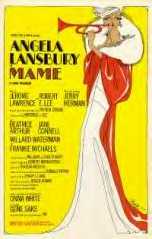
Mame is a musical with a book by Jerome Lawrence and Robert Edwin Lee and music and lyrics by Jerry Herman. Originally titled My Best Girl, it is based on the 1955 novel Auntie Mame by Patrick Dennis and the 1956 Broadway play of the same name by Lawrence and Lee. A period piece set in New York City and spanning the Great Depression and World War II, it focuses on eccentric bohemian Mame Dennis, whose famous motto is "Life is a banquet and most poor sons of bitches are starving to death." Her fabulous life with her wealthy friends is interrupted when the young son of her late brother arrives to live with her. They cope with the Depression in a series of adventures.
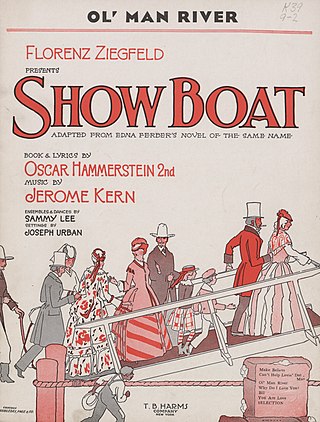
Show Boat is a musical with music by Jerome Kern and book and lyrics by Oscar Hammerstein II. It is based on Edna Ferber's best-selling 1926 novel of the same name. The musical follows the lives of the performers, stagehands and dock workers on the Cotton Blossom, a Mississippi River show boat, over 40 years from 1887 to 1927. Its themes include racial prejudice and tragic, enduring love. The musical contributed such classic songs as "Ol' Man River", "Make Believe", and "Can't Help Lovin' Dat Man".
A cast recording is a recording of a stage musical that is intended to document the songs as they were performed in the show and experienced by the audience. An original cast recording or OCR, as the name implies, features the voices of the show's original cast. A cast recording featuring the first cast to perform a musical in a particular venue is known, for example, as an "original Broadway cast recording" (OBCR) or an "original London cast recording" (OLCR).
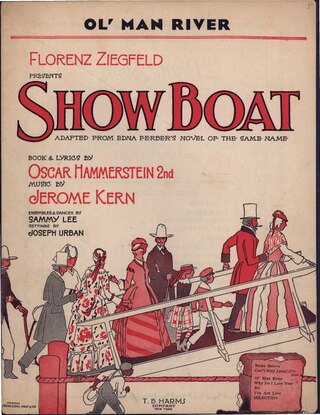
"Ol' Man River" is a show tune from the 1927 musical Show Boat with music by Jerome Kern and lyrics by Oscar Hammerstein II, who wrote the song in 1925. The song contrasts the struggles and hardships of African Americans with the endless, uncaring flow of the Mississippi River. It is sung from the point of view of a black stevedore on a showboat, and is the most famous song from the show. The song is meant to be performed in a slow tempo; it is sung complete once in the musical's lengthy first scene by the stevedore "Joe" who travels with the boat, and, in the stage version, is heard four more times in brief reprises. Joe serves as a sort of musical one-man Greek chorus, and the song, when reprised, comments on the action, as if saying, "This has happened, but the river keeps rolling on anyway."
"Seasons of Love" is a song from the 1996 Broadway musical Rent, written and composed by Jonathan Larson. The song starts with an ostinato piano motif, which provides the harmonic framework for the cast to sing "Five hundred twenty-five thousand, six hundred minutes". The main instruments used throughout the song are piano, vocals, guitar, organ, bass and drums.
"If I Were a Bell" is a song composed by Frank Loesser for his 1950 musical Guys and Dolls.
"I've Grown Accustomed to Her Face" is a song from the 1956 musical My Fair Lady, with music by Frederick Loewe and lyrics by Alan Jay Lerner. It was originally performed by Rex Harrison as Professor Henry Higgins who also performed it in the 1964 film version.

"Big Spender" is a song written by Cy Coleman and Dorothy Fields for the musical Sweet Charity, first performed in 1966. Peggy Lee was the first artist to record the song for her album of the same name also that year. It is sung, in the musical, by the dance hostess girls; it was choreographed by Bob Fosse for the Broadway musical and the 1969 film. It is set to the beat of a striptease as the girls taunt the customers.
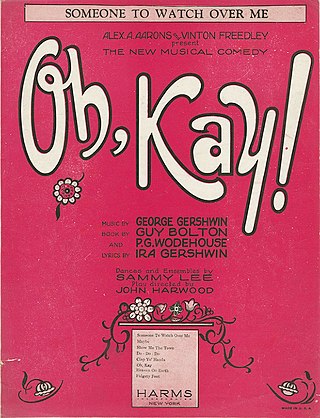
"Someone to Watch Over Me" is a 1926 song composed by George Gershwin with lyrics by Ira Gershwin, assisted by Howard Dietz who penned the title. It was written for the musical Oh, Kay! (1926), with the part originally sung on Broadway by English actress Gertrude Lawrence while holding a rag doll in a sentimental solo scene. The musical ran for more than 200 performances in New York and then saw equivalent acclaim in London in 1927, all with the song as its centerpiece. Lawrence released the song as a medium-tempo single which rose to number 2 on the charts in 1927.
"Cabaret" is the title song of the 1966 musical of the same name, sung by the character Sally Bowles. It was composed by John Kander, with lyrics by Fred Ebb.
"If My Friends Could See Me Now", with music by Cy Coleman and lyrics by Dorothy Fields, is a song from the 1966 Broadway musical Sweet Charity. In the musical the character of Charity, played in the original New York cast by Gwen Verdon, reflects on her marvellous luck as she spends time with Vittorio. In the 1969 film adaptation of Sweet Charity, "If My Friends Could See Me Now" is performed by Shirley MacLaine.
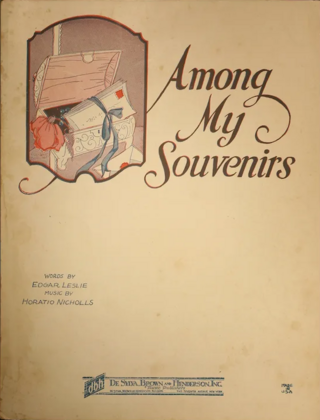
"Among My Souvenirs" is a 1927 song with words by Edgar Leslie and music by Horatio Nicholls.
Bill Elliott is an American pianist, bandleader, Hollywood composer and Broadway orchestrator. In 2015, he won a Tony Award for best orchestration for the Broadway musical, An American in Paris. In 2012 he was nominated for both Tony and Grammy awards for Broadway's Nice Work if You Can Get It. Elliott won Drama Desk Award for Outstanding Orchestrations in 2017 for the Broadway Musical Bandstand.












